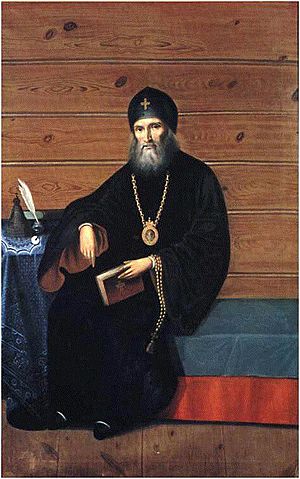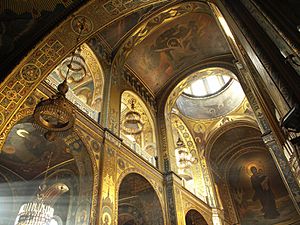Philaret Drozdov facts for kids
Quick facts for kids |
|
|---|---|
| Metropolitan and archbishop of Moscow | |

Metropolitan Filaret in his cell, 1850
|
|
| Church | Russian Orthodox Church |
| See | Moscow |
| Enthroned | 1821 |
| Reign ended | 1867 |
| Predecessor | Seraphim, Metropolitan of Moscow |
| Successor | Innocent of Alaska |
| Personal details | |
| Born | 26 December 1782 |
| Died | 1 December 1867 |

Metropolitan Philaret (whose real name was Vasily Mikhaylovich Drozdov) was a very important leader in the Russian Orthodox Church. He served as the Metropolitan of Moscow and Kolomna for over 40 years, from 1821 to 1867. He was born on December 26, 1782, and passed away on December 1, 1867.
He was recognized as a saint on October 13, 1994. His special day, or feast day, is celebrated every year on November 19.
Contents
Philaret's Journey: From Student to Metropolitan
Philaret was born in Kolomna as Vasily Drozdov. His father was a priest. Vasily studied at the seminary in Kolomna, where classes were taught in Latin. He then went to the Troitse-Sergiyeva Lavra, a famous monastery. After finishing his studies, he became a professor there.
In 1806, he became a preacher at the lavra. In 1808, he became a monk and was given the name Philaret. This name was chosen in honor of Saint Philaret the Merciful. In 1809, he became a theology professor at the church academy in St. Petersburg. He was promoted to archimandrite (a high-ranking monk) in 1811 and became the director of the academy in 1812.
Philaret During the French Invasion
The events of 1812 had a big impact on Philaret. He believed that Russia's success was due to moral strength. He gave a speech about this idea. In 1813, he gave another famous speech when the military leader Kutuzov passed away.
In 1817, Philaret took his final monastic vows. Soon after, he became a bishop in Reval. Then he became an assistant bishop in St. Petersburg. In 1819, he was made Archbishop of Tver and joined the Most Holy Synod. This was a very important group that governed the Russian Church. The next year, he became archbishop of Yaroslavl. Finally, in 1821, he moved to Moscow, becoming its metropolitan in 1826.
Later Life and Influence
Philaret was known for speaking his mind. This sometimes caused problems with the emperor. From 1845 until Alexander II became emperor, Philaret was not in the emperor's favor. In 1855, he was told to stay within his own church area.
It is believed that Philaret helped write the important announcement that freed the serfs (people who were tied to the land) in 1861. He was also known as one of the best speakers and preachers of his time in Russia.
Philaret was the spiritual guide for a missionary monk named Macarius (Glukharyov). Macarius was later recognized as a saint in 2000 for his work with the Altai.
Philaret was involved in church policies that affected different groups, including the Old Believers.
Philaret's Important Writings
Philaret played a big part in creating a Russian translation of the Bible. Before this, only a Church Slavonic version was available, which most people could not easily understand. He also wrote many books on theology and history. These works are often called the Filaretica.
Some of his well-known writings include:
- Colloquy between a Believer and a Skeptic on the True Doctrine of the Greco-Russian Church (1815)
- Compend of Sacred History (1816)
- Commentary on Genesis (1816)
- Sermons delivered at Various Times (1820)
- Christian Catechism (1823)
- Principles of Religious Instruction (1828)
Philaret also wrote poems from a young age. His exchange of poems with the famous writer Pushkin is quite famous.
See also
 In Spanish: Filareto II de Moscú para niños
In Spanish: Filareto II de Moscú para niños
 | James Van Der Zee |
 | Alma Thomas |
 | Ellis Wilson |
 | Margaret Taylor-Burroughs |

